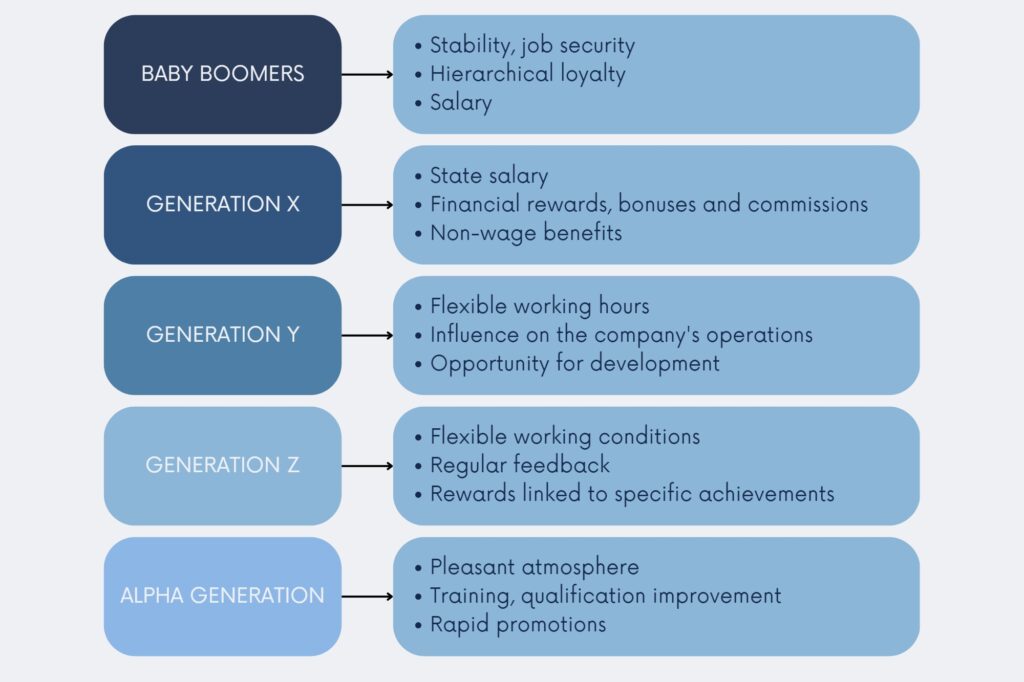
How to motivate different generations?
There are currently four generations operating simultaneously in the labor market: baby boomers, Generation X, Generation Y, also known as the Millennial generation, and Generation Z(C). What’s more, the next generation – Alpha – is already slowly entering the market. Each of them has different needs, motivations, lifestyles or approaches to work, so managing generational diversity – including effectively motivating different generations – is becoming increasingly important.
Table of contents
1. Baby boomers
This is the oldest generation active in the labor market. Representatives of the baby boomers generation are people born after World War II who experienced political and socio-economic changes in their youth. They began their professional activity in uncertain times, during the period of martial law and the Solidarity trade union protests. According to them, professional success can be achieved through hard work. They are experienced people with a wide range of knowledge. Their main values are adherence to principles, respect for authority and hierarchical loyalty. For the Baby boomers generation, the most important aspect is a sense of stability and security. They are characterized by a low degree of job mobility, and become attached to the organization where they have worked for many years. For this generation, the best motivation for work is stable employment and money. As a rule, they are not interested in additional, non-wage benefits, except, for example, private health care.
2. Generation X
Generation X’s career start took place during the restructuring of the state economy. Due to high unemployment and job insecurity, they accepted job offers that were temporary and required far fewer qualifications than they had. Such a start contributed to Generation X’s fear of losing their jobs and high opinion of job stability. Having learned from their parents’ experience, they work to live, not live to work. This is because they care about both their professional and private lives. They believe that success against a professional background obliges education, the acquisition of valuable and relevant skills. The values they consider most important are self-reliance and self-sufficiency. Generation X are professionals who value tradition and quality. Work itself is a value to them. Like the previous generation, their greatest motivation for work is their base salary. They are also motivated by bonuses, bonuses, commissions or financial rewards. For Generation X employees, non-salary perks are also important, including a company car, training and development opportunities, work comfort (appropriate conditions on the job, organizational culture) and a friendly atmosphere.
3. Generation Y
This is the first generation that grew up under capitalism. The absence of political and social restrictions, the possibility of labor emigration, freedom of speech and religion, and the availability of modern technologies for communicating and processing information were a natural reality for them. The development of the Internet has provided Generation Y with access to electronic knowledge and the ability to communicate with the world, which previous generations did not have. As a result, representatives of the generation feel a great need to use electronic devices, using them for professional as well as private purposes. Generation Y recognizes work as a way to pursue a passion that will enable continuous development. It is important for them to maintain a work-life balance, hence they expect flexible working hours. Unlike previous generations, salary is not the biggest motivation for them. Generation Y values freedom in the workplace.
4. Generation Z
Also referred to as Generation C (from the English word “connected,” meaning networked). This is the generation of the technological and social revolution. Some of Generation Z are still studying and are just beginning their careers. The Internet and electronic devices are a daily reality for them, they are unable to function without them. They are characterized by very good knowledge of foreign languages and high dynamism. They look for jobs both in Poland and abroad. In the work environment, they do not look for stability of employment and avoid monotony. They prefer group work and are multi-taskers. Work life balance is one of the most important motivations for them. They want to explore the world and will not be willing to stay at work after hours, so they need flexible working conditions. They also expect regular feedback from their superiors. Representatives of this generation are focused on results, so in their case rewards should be closely linked to specific achievements and they should be constantly stimulated to work.
5. Alpha generation
This is the first generation born in the 21st century. Raised with computers, tablets and smartphones in hand, they spend their time mainly on social media. They are great at navigating the web and can’t stand boredom. They’re young people, so many of them don’t yet have their career plans spelled out. When asked about their dream company, they point to ones that offer quick promotions, training, skill enhancement and a good atmosphere. This is a generation that does not want to work in state jobs. A quarter of representatives of the Alpha generation say they want to start their own company. In turn, almost half of them want to work in a corporation with a recognizable brand.
6. Summary

Effective motivation of employees therefore requires taking into account the differences that exist between them and adapting the ways of motivation to their different needs and expectations. Generational differences cannot be ignored because the labor market is constantly changing. New, increasingly younger generations are entering it, whose co-workers are often people much older than them. It is necessary to ensure that their cooperation is smooth, conflict-free and efficient – in accordance with the concept of Lean Management. If you need help, we will be happy to help and conduct lean training on managing generational diversity for you.

